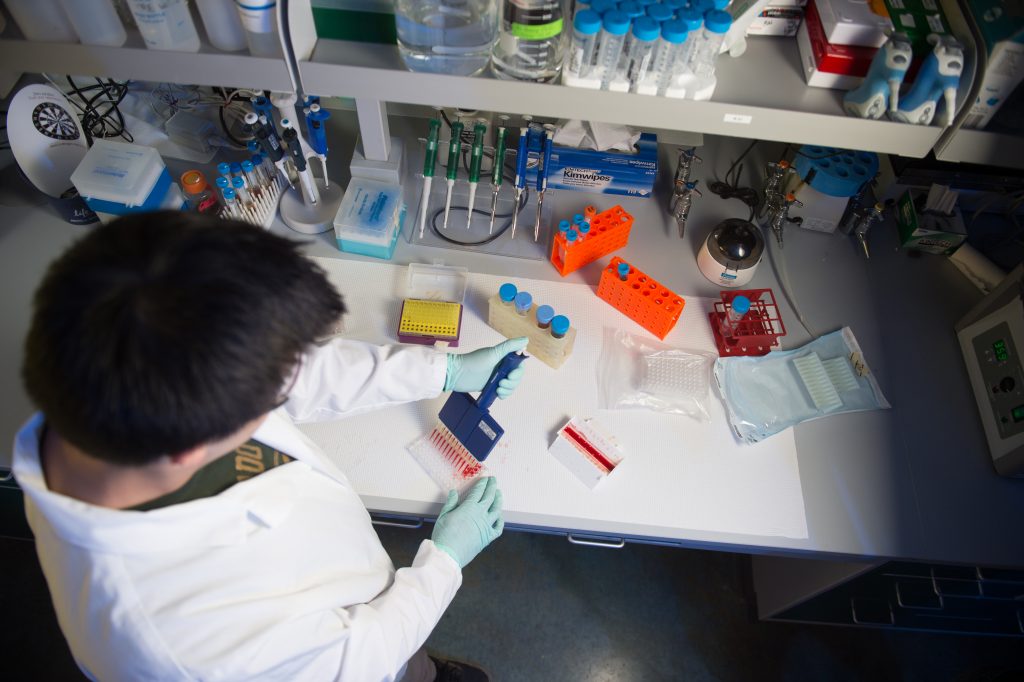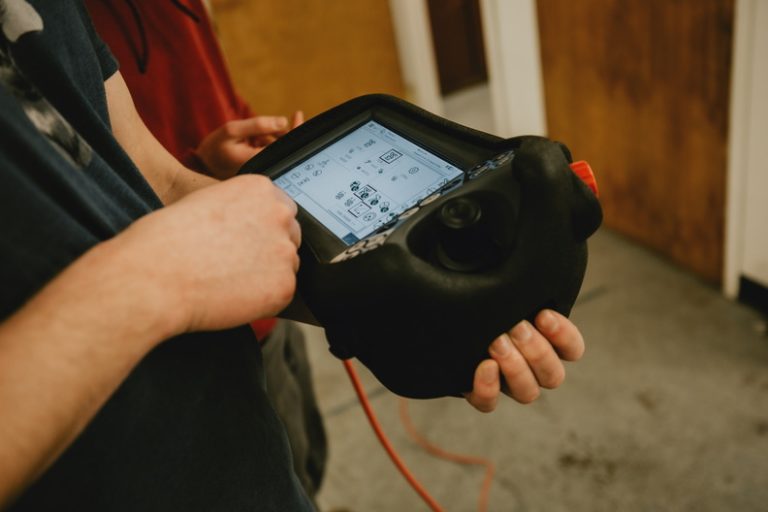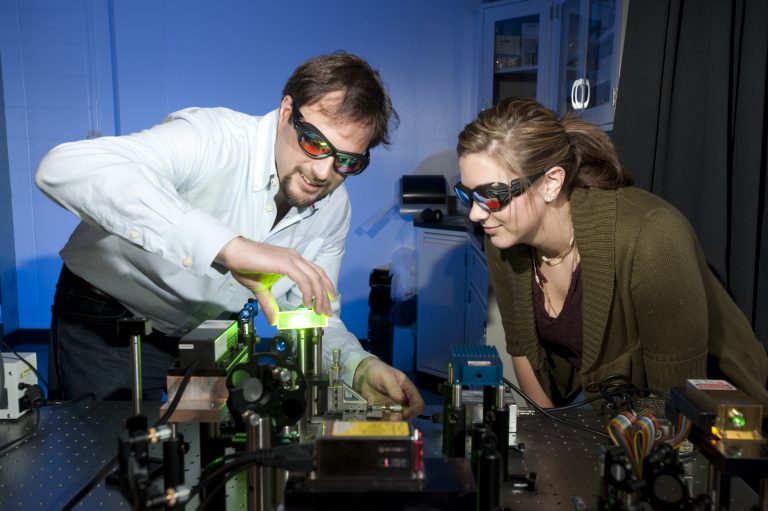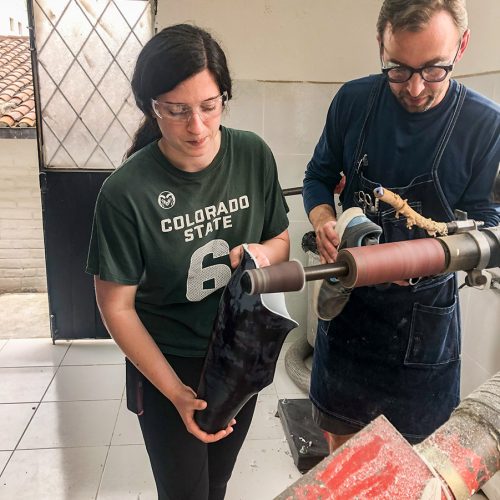UNDERGRADUATE PROGRAMS
Biomedical Engineering
Our BME program is unique!
Choose your pathway & receive 2 bachelor's degrees
At CSU, graduates of the biomedical engineering (BME) program receive two degrees: one B.S. in biomedical engineering (BME) and the other B.S. in one of the four traditional engineering areas.
As the first bachelor’s program in the state of Colorado, CSU pioneered education efforts in this growing area. Our program combines the breadth of biomedical engineering with the depth of a traditional engineering degree in five years, helping our dual degree graduates be more competitive in the job market and for graduate studies. We emphasize transdisciplinary learning and application – whether in the classroom, laboratory, internship, study abroad, senior design or other academic or experiential learning opportunities – so that our graduates are well prepared for their next steps.
Explore these four pathways to discover which one is right for you.
Biomedical Engineering + Chemical and Biological Engineering (BME+CBE)
With emphasis on process engineering, computer modeling and quantitative biology, the BME+CBE program provides solid chemical/biological/biomedical engineering skills to work with technologies that use biology and chemistry to identify and improve health.
Potential Occupations
The BME+CBE pathway will enable you to develop or improve therapies for fighting cancer, tuberculosis, or other illnesses and diseases (e.g., nanoscaffolding for localized chemotherapy delivery, telemetric sensors to determine healing rates in bone fractures or to detect key chemicals in live tissue with high temporal and spatial resolution).
Job Outlook
According to the Bureau of Labor Statistics, employment of biomedical engineers is projected to grow 6% from 2020 to 2030, about as fast as the average of all occupations. However, employment of chemical engineers is projected to grow 9% from 2020 to 2030.
Occupational Outlook Handbook

Critical Skills & Abilities
In addition to the important qualities required of a biomedical engineer (creativity as well as analytical, communication, math, and problem-solving skills), chemical and biological engineers need:
Ingenuity
When faced with a production problem, for example, chemical engineers must apply creative and resourceful thinking to work through the problem.
Interpersonal skills
Working with teams, it is critical for chemical engineers to communicate and relate to others. Developing strong conflict management, listening, and negotiating skills will help in the workplace.
Biomedical Engineering + Computer Engineering (CpE)
BME+CpE students learn to develop/design/enhance technologies that harness electrical signals into technologies that support health –design medical instruments that image and/diagnose/treat illnesses; detect threats to food safety and security; utilize biosensors to diagnose cancer cells.
Potential Occupations
The BME+CpE pathway will enable you to design hardware and software interfaces that solve problems in the healthcare industry. For example, developing or designing software for medical devices, applications, and robotics. The merging of these two fields provides students with a wealth of areas in which to work.
Job Outlook
According to the Bureau of Labor Statistics, employment of biomedical engineers is projected to grow 6% from 2020 to 2030, about as fast as the average of all occupations. However, employment of computer engineers is projected to grow only 2% from 2020 to 2030.
Occupational Outlook Handbook

Critical Skills & Abilities
In addition to the important qualities required of a biomedical engineer (creativity as well as analytical, communication, math, and problem-solving skills), computer engineers need:
Analytical
When designing complex hardware, computer engineers use programming tools to analyze digital circuits.
Critical thinking
Computer engineers must use keen reasoning to evaluate assumptions and identify the pros and cons of alternative solutions.
Problem solving
Computer engineers identify complex hardware and software issues and find the best solutions.
Communication
Often working on teams with other engineers, it is essential for computer engineers to clearly articulate computer issues. They must be able to convey information or instructions effectively, not only to their peers, but also to nontechnical individuals.
Biomedical Engineering + Electrical Engineering (EE)
BME+EE and BME+EE/L&O students learn to develop/design/enhance technologies that harness electrical signals into technologies that support health –design medical instruments that image and/diagnose/treat illnesses; detect threats to food safety and security; utilize biosensors to diagnose cancer cells.
Potential Occupations
The BME+EE pathway will enable you to develop or design better ways to image and/or diagnose illnesses. For example, using laser-based imaging to detect viruses, developing ways to increase electrical signals to detect threats to food safety and security, designing biosensors to diagnose cancer cells, or developing software to determine toxic pesticide levels in people. You might also design medical instruments including MRI, ultrasound, or x-ray machines.
Job Outlook
According to the Bureau of Labor Statistics, employment of biomedical engineers is projected to grow 6% from 2020 to 2030, about as fast as the average of all occupations. However, employment of electrical engineers is projected to grow 7% from 2020 to 2030.
Occupational Outlook Handbook

Critical Skills & Abilities
In addition to the important qualities required of a biomedical engineer (creativity as well as analytical, communication, math, and problem-solving skills), electrical engineers need:
Concentration
When designing and developing complex electrical systems, electrical engineers must keep track of multiple design elements and technical characteristics when performing these tasks.
Initiative
Keeping up with the latest changes in the industry is an critical element for electrical engineers. They must apply their new knowledge to the project they undertake.
Interpersonal Skills
Electrical engineers must collaborate with others to ensure that their plans are implemented correctly. This may include keeping a group “on track” and moving toward the completion of a project or interacting effectively with peers and supervisors.
Speaking skills
Electrical engineers work on complex projects with lots of detail and, often times, work closely with other engineers and technicians. They must be able to convey information or instructions clearly and effectively, not only to their peers, but also to customers who may not have the technical expertise.
Writing skills
The ability to write concisely is imperative for electrical engineers, as they often develop design methods documents, maintenance or operation manuals, parts lists, and product proposals related to equipment they develop.
Biomedical Engineering + Mechanical Engineering (BME+MECH)
Our BME+MECH graduates are prepared to help design medical devices and equipment that support movement in the body – e.g. prosthetics, exercise equipment for astronauts, bone scaffolding, exoskeletons or next-gen diagnostic and therapeutic surgical tools – as well as work with biomaterials or other elements that support improved health.
Potential Occupations
The BME+MECH pathway will enable you to design medical devices and equipment (e.g., pacemakers, assistive devices, artificial internal organs, replacement body parts, surgical tools, exercise equipment for astronauts)
Job Outlook
According to the Bureau of Labor Statistics, employment of biomedical engineers is projected to grow 6% from 2020 to 2030, about as fast as the average of all occupations. Employment of mechanical engineers is projected to grow 7% from 2020 to 2030.
However, because mechanical engineers can work in many industries, the growth rate will differ depending on the industry that employ them.
Occupational Outlook Handbook

Critical Skills & Abilities
In addition to the important qualities required of a biomedical engineer (creativity as well as analytical, communication, math, and problem-solving skills), mechanical engineers need:
Listening skills
Listening skills are imperative to understand and analyze different ideas or approaches from other members of a team, such as architects and computer scientists.
Mechanical skills
A mechanical engineer must be comfortable operating equipment and tools. They are adept at fixing things and intuitively see how things work. They apply basic engineering concepts and mechanical processes to the design of new devices and systems.